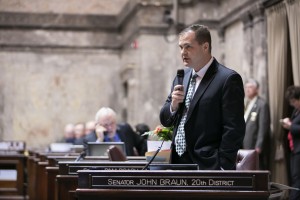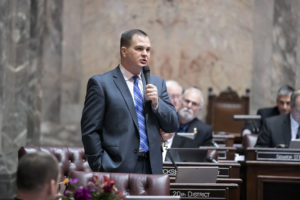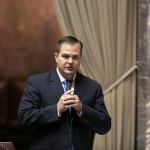 OLYMPIA…Senate Majority Coalition Caucus members today introduced landmark reforms that would return state government to the role of primary provider for Washington’s K-12 schools while finally connecting school funding with the actual cost of educating students.
OLYMPIA…Senate Majority Coalition Caucus members today introduced landmark reforms that would return state government to the role of primary provider for Washington’s K-12 schools while finally connecting school funding with the actual cost of educating students.
The MCC’s Education Equality Act is the first complete, ready-for-voting solution proposed by lawmakers since the state Supreme Court ruling in McCleary v. Washington. The 2012 ruling highlighted what was already known: decades of putting other services ahead of schools caused Washington’s 295 school districts to rely too much on local property tax-levy money to cover costs that should be the state’s responsibility. The Legislature has until April 1 to agree on a new funding approach that takes effect before 2018.
Sen. John Braun, as chair of the Senate Ways and Means Committee, is the Senate budget leader, and was one of the MCC members to serve recently on a bipartisan Joint Education Funding Task Force. That group managed to obtain educator-compensation information that was denied to lawmakers for more than a year, and was one of the final pieces needed to complete the MCC plan.
Braun said the Education Equality Act would not only result in full state-level funding of public schools but also address factors that have made the K-12 system inequitable for students, teachers and taxpayers.
“Our plan is student-centered and teacher-friendly. It’s based on fair and transparent funding and promotes local control and accountability. By any credible measure, this is a progressive approach that should eliminate the educational-opportunity gap, and the associated social injustices, caused by inconsistent district-level funding,” said Braun, R-Centralia.
“It also responds to concerns teachers have about compensation, and the concerns districts have about hiring as well as the so-called ‘levy cliff.’ These issues are outside of the Legislature’s constitutional mandate but are part of the larger picture, so it makes sense to include them in our set of reforms,” he added.
Under the MCC plan, legislators set a statewide per-student funding level that puts Washington in the upper ranks nationally; require each school district to levy the same local property-tax rate and put that revenue toward the per-student amount; and allocate state funds to cover the difference between the per-student standard and the local funding.
The per-student funding level would be higher, and the state’s contribution would increase accordingly, to cover additional services for children who have special needs, or are homeless, or are not native English speakers.
The benefits of the Education Equality Act, Braun explained, include a consistent state investment in each Washington student regardless of ZIP Code, and an end to wild swings in local school-levy rates – caused by varying property values between districts – which are inequitable to taxpayers and contribute to disparities in teacher pay.
In addition, the MCC proposes ending the statewide pay grid that limits teacher compensation based on service years and education and does not account for the local cost of living. This would allow districts more flexibility and control when it comes to recruiting and retaining teachers.
“The governor and others talk about brand new taxes to pay for schools, even though revenue from an energy tax or a tax on certain forms of income can’t possibly qualify as the ‘regular and dependable’ source the Supreme Court expects,” Braun said. “Our plan relies on a traditional funding source that meets the ‘regular and dependable’ standard set by the Supreme Court, and is familiar to families and employers in our state.
“Making up for decades of inattention and the resulting inequities isn’t easy, but this approach checks all the boxes. It’s sweeping, it’s straightforward, and it’s sensible.”














